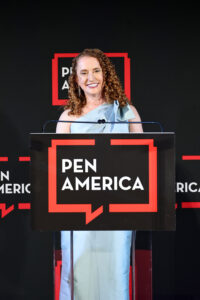PEN America CEO Suzanne Nossel’s Remarks at the 2024 Literary Gala

NEW YORK, NEW YORK – MAY 16: Suzanne Nossel speaks during the 2024 PEN America Spring Literary Gala (Photo by Jamie McCarthy/Getty Images for PEN America)
A year ago, we assembled under this whale and celebrated Narges Mohammadi, jailed for championing women’s lives and liberties. Believers in the freedom to write from varied backgrounds and viewpoints saluted Narges’ sacrifice, which would earn her the Nobel Peace Prize.
Tonight, the shared purpose that bound us so tightly behind Narges has frayed. Our assembly is disassembling. People of good intention and staunch conviction are wracked by a wrenching conflict. We are haunted by destruction, death, and suffering that has caused some to question PEN America’s words, deeds, and purpose.
Inflection points force us to revisit PEN America’s basic principles. To me, there are four: defense of free expression, respect for varied viewpoints, faith in dialogue across difference, and a commitment to reckon with complexity in search of truth.
First, we challenge rulers who imprison the likes of Narges and the more than 100 writers behind bars in China. We thwart would-be authoritarians who ban books and outlaw curricula. We stand for the right to protest and petition, even when we disagree with the message or tactics of the protester.
“I’m a writer,” James Baldwin wrote. “I like doing things alone.” We prize writers for their singularity. But PEN’s power is collective. Our ability to defend writers is strengthened when we speak for – and to – many. Conceived in the ashes of world war, PEN understood conflict not as a reason why writers could not unite, but as a reason why they must.
Not too long ago PEN America was New York-centric and known for big personalities – Mailer, Miller, Bellow, Sontag. Thanks primarily to the work of our extraordinary staff we now embody and serve a younger, edgier and more representative community. It is one more in keeping with the second of PEN’s principled commitments: to being a home to writers of all genres, ideologies and persuasions. I’ve often said that among all the writers of PEN America, they could agree on very little, except perhaps the drive to free a Narges, an Evan Gershkovich or tonight’s Freedom to Write honoree Pham Doan Trang.
In our fractured society, sustaining a broad organization based on a finite set of unifying principles has become far more challenging. It’s also become far more necessary. We’ve defended drag shows, Moms for Liberty, right wing provocateurs and a revolutionary communist party bookstore. We work with LGBTQ groups, with clergy, with libertarians and librarians, depending on the issue.
A few years ago, we advocated for NFL players’ right to take a knee to demonstrate for criminal justice overhaul. One of our partners in that campaign asked us to endorse their specific demands for bail and policing reform. While their goals sounded worthy, we said no. To hold our community together we must stick with what defines us: free expression; the right to take a knee and the sacred liberty we each hold to call for the change we seek. The test of our partnerships is whether we can find common cause, not whether we approach every cause in common.
And when values come into conflict, our sanctuary is dialogue. PEN believes in dialogue not as a concession, but as a catalyst to new understandings. We’ve held conversations between the #MeToo movement’s most faithful and its stiffest critics. Between authors who decry cultural appropriation and those who abhor any such constraint on the imagination.
The value of that dialogue is premised on our fourth principle: an appreciation of complexity. We do path-breaking work on how to protect free speech on campus without turning a blind eye to bigotry. We analyze disinformation as both the exercise of free expression and as a grave threat to it. We reject facile analogies and false equivalencies. Some accuse us of drowning in nuance. Perhaps. But nuance has propelled us forward. In a world dominated by soundbites and simplifications, our commitment to facing and reconciling tensions has set us apart and allowed us to break through.
Now once more, PEN’s principles are being tested. People of deep conviction have raised good faith criticisms – ones that we take to heart. We’ve grappled with how to satisfy the moral conscience of some writers without affronting that of others. Our work to call out assaults on Palestinian writers has been extensive and evolving. When writers are in danger, we always push ourselves to do more.
My personal touchstone, very simply, is that when it comes to Israel and Palestine, you cannot care about ONE people without caring about the other. No one history, no one tragedy and no one trauma forecloses another. The truth, and the path to peace, must somehow encompass them all.
Never do principles matter more than when passions are hot and minds are made up. That is when the single, flattening story is at its most dangerous. When we feel challenged and targeted, we need to reject both the impulse to lash out, as well as the temptation to bend in the hope of making it stop. Those are the moments when we must listen most closely, reflect most deeply, and hold most firmly to what we stand for and why.
PEN’s Charter states: “Literature knows no frontiers and must remain common currency among people in spite of political or international upheavals.”
At PEN America, we’re not dogmatists. We’re not racing to be the first, the loudest, or most severe in our rhetoric. We are writers, readers, supporters and staff who lift up authors, books, and stories. We stand for free speech. We safeguard open discourse. We are inspired by the guiding light of our 102 year history. We persevere. We hold fast to our principles. And we thank you for your courage in standing with us tonight.






